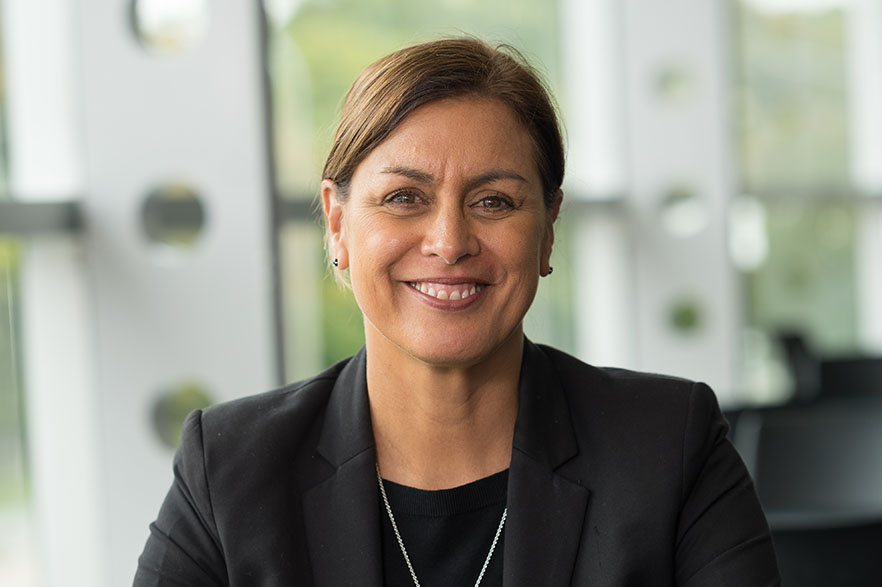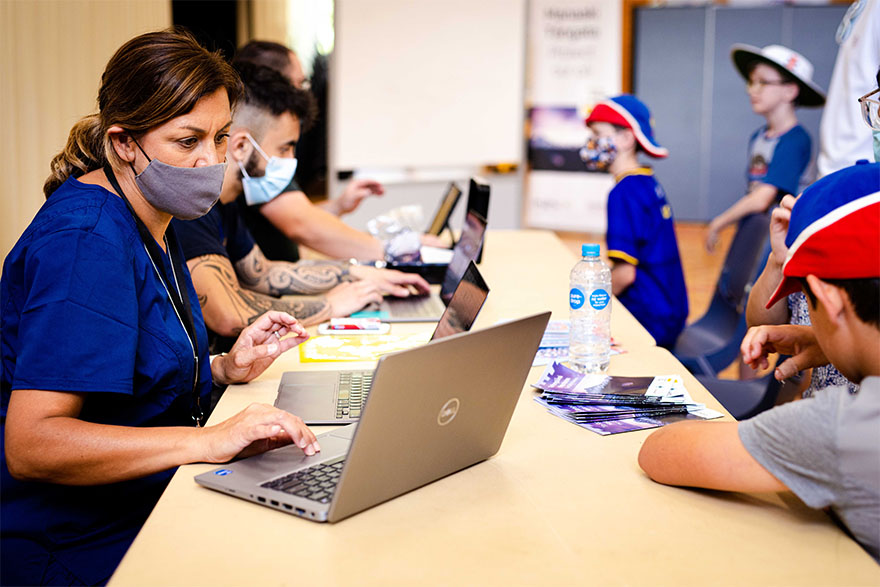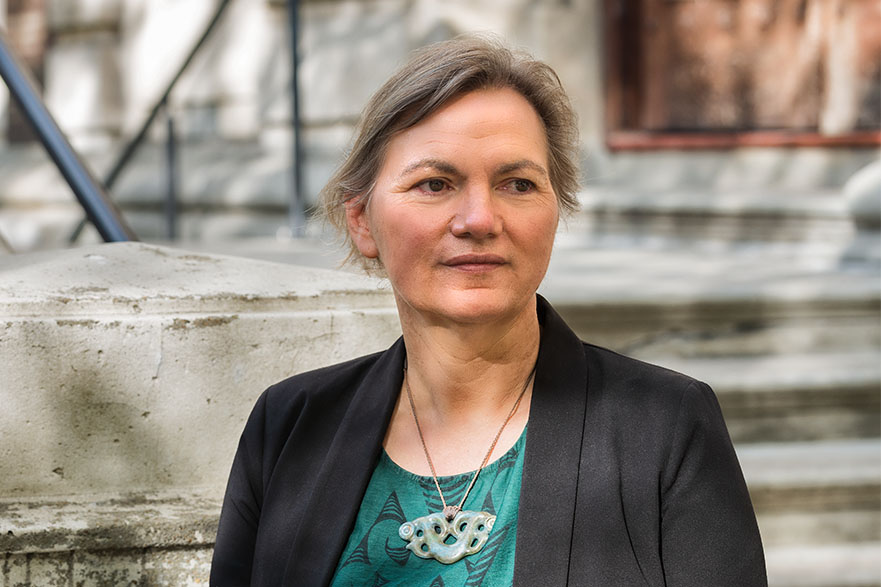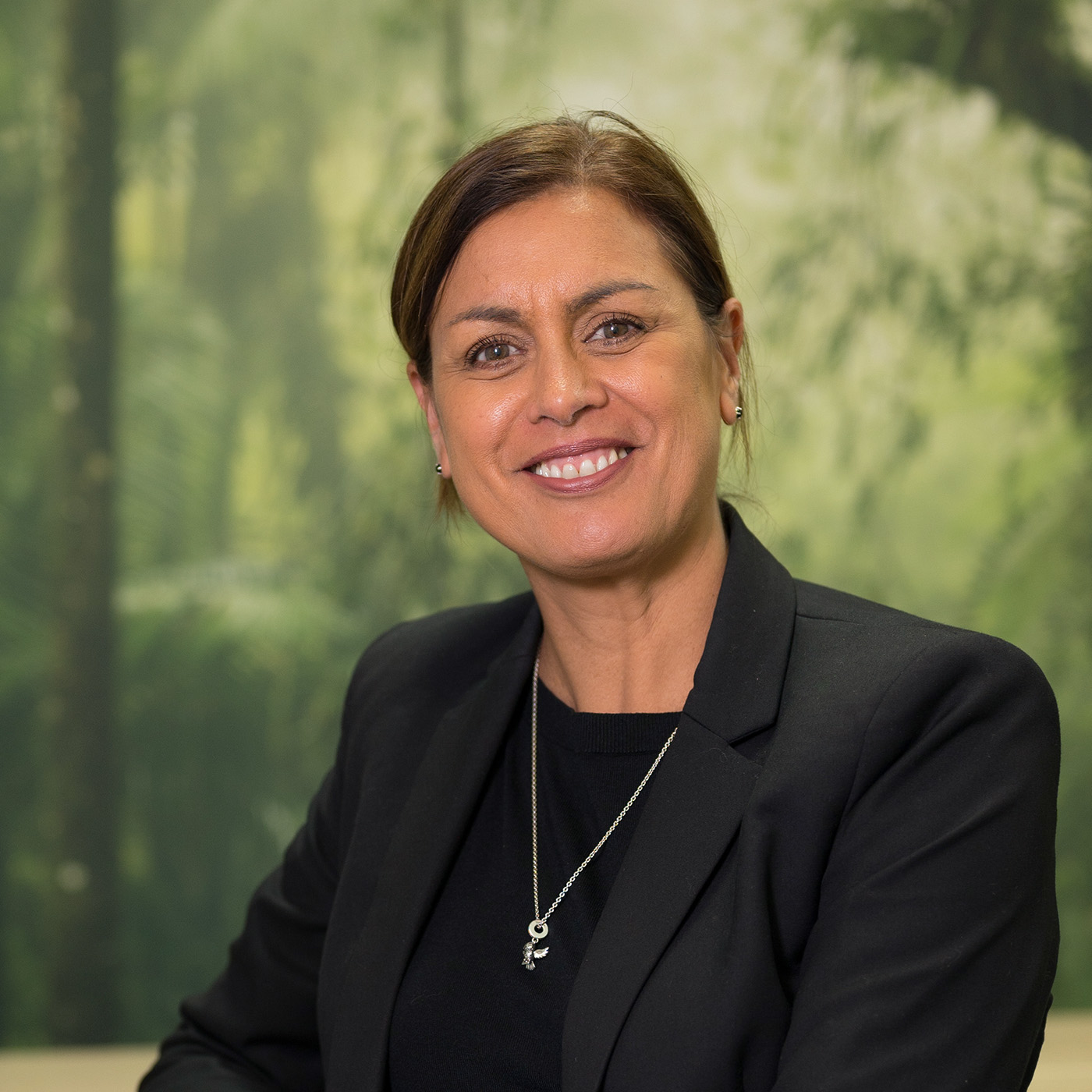Feature
Landmark wahine Māori leadership
The University of Otago has welcomed two wahine Māori leaders to pivotal positions, with Professor Suzanne Pitama taking up the role of Dean and Head of the University of Otago, Christchurch, and Professor Joanne Baxter being named the next Dean of the Dunedin School of Medicine.
Suzanne Pitama: building on a legacy of Māori leaders
Professor Suzanne Pitama brings a lifetime of experience and achievement to her history-making role as the first Māori female Dean and Head of Campus at the University of Otago, Christchurch (UOC).
Her appointment follows decades of academic success, awards and a raft of senior University positions, most recently as Associate Dean Māori at UOC and Director of the Māori Indigenous Health Institute (MIHI).
Pitama (Ngāti Kahungunu, Ngāti Whare) also brings a leadership style of her own, with origins going back to her roots in a small village on tribal land in northern Hawkes Bay.
She was brought up in te reo Māori, surrounded by nannies and extended family, with three marae in easy walking distance of her whānau homestead.
“I now know that was a privilege, but I didn't think of it like that at the time — it was just my normal,” says Pitama. “I was raised in a collective community, and I think my leadership reflects that upbringing. It's about collectivism, collegiality and collaboration.”
Pitama was the first of her family to go to university, studying Psychology, which was suggested to her by a school guidance counsellor. “Having had lots of people around me at home was a good introduction to dealing with people – and I thought it could be a good way of giving back to my community later on.”
After a BA in Psychology and Māori Studies Pitama took advice to get life experience before starting postgraduate work, spending 18 months on a mission with The Church of Jesus Christ of Latter-day Saints. After an MA, she completed a postgraduate diploma in Educational Psychology and registered as a practising psychologist.
“Educational Psychology allowed me to work in a holistic way, so to support children, I was able to work alongside the child, their school, their communities and their families.”

Professor Suzanne Pitama at the Christchurch campus.
Photo: Neil Macbeth
In 2001 Pitama and her husband Hare (Ngāi Tahu) moved south to Christchurch to be closer to his whānau and she joined the UOC as a lecturer in the Department of Public Health.
She was still practising as a psychologist, but gradually she became a full-time academic, with a breakthrough PhD in 2013 on the design, implementation and impact of indigenous health curricula within medical schools.
“It was a natural marriage of two of the subjects I love the most, psychology and teaching. But it was also the first research of its kind in the world and I'm still getting follow-ups from it.”
Much of Pitama's current research focuses on Māori health equity. Projects funded by the Health Research Council of New Zealand (HRC) involve work on mental health (led by Associate Professor Cameron Lacey) and on cardiovascular disease (led by Clinical Senior Lecturer Philip Adamson).
Several of her many other projects investigate chronic illness and the experiences indigenous patients have in the health system. She advocates for Kaupapa Māori-care and is working on general Māori community health, child mental health and improving medical curricula.
She is a board member of the HRC, where she chairs the Māori Health Committee, and until recently was a director on the Australia Medical Council, and Chair of the Aboriginal, Torres Strait Island and Māori committee.
Other professional involvement includes the New Zealand Psychological Society, He Paiaka Tōtara (Māori psychologist roopu), Tūmāia Kaiārahi (Māori advisory group to the New Zealand Psychologists Board), Association for Medical Education Europe (AMEE) social accountability committee member and assessor, and the Ministry of Health Māori Health Action Plan Advisory group (Whakamaua) (2019-2020).
Service roles include Hauora Māori faculty representative at the Otago Medical School and co-Director of Te Poutama Rau, which aims to utilise Māori learning methods within tertiary education. She has recently been a committee member reviewing the University's Mirror on Society overseeing health professional courses.
Pitama has also been involved in editorial roles on the New Zealand Medical Journal and The Clinical Teacher, where she guest-edited a special edition on diversity and equity.
Awards include the Prime Minister's Supreme Award for Tertiary Teaching Excellence in 2015, the Indigenous Leadership Award from the Leaders in Indigenous Medical Education (Australasian) Community of Practice, and the Royal Society of New Zealand's Joan Metge Medal in 2018 for her research around indigenous medical education.
Pitama feels she is following in the footsteps of inspirational Māori leaders.
“When I think of our earliest graduates like Te Rangihiroa, the first Māori Dean of a Medical School, Professor Eru Pomare, the work in te reo Māori from Professor Poia Rewi, and mana wahine leadership like Professor Jacinta Ruru, I realise the mahi they put in, and the work before me now to build on their legacies.”
“I was raised in a collective community, and I think my leadership reflects that upbringing. It's about collectivism, collegiality and collaboration.”
Pitama had never considered she was destined for the top job in Christchurch, but realises that she was probably being shepherded in that direction.
“I worked with some amazing people at the University of Otago, Christchurch and I suspect I had been getting some coaching – invisible to me – to gradually keep advancing to more senior leadership roles. When the opportunity to apply to be Dean arose, a lot of my peers encouraged me to go for it. So it's been pretty humbling to realise how I've been guided into this role. I could say my peers talked me into it. Now I'm here I have to deliver.
“It's exciting and I have got a lot of great people around me equally committed to attaining our goals, which include fostering growth at the UOC.”
Pitama's vision includes implementing governance that aligns with Te Tiriti o Waitangi, ensuring the campus is well-positioned to contribute to the upcoming national health reforms, and increasing awareness of UOC's brand.
“Christchurch is different from Dunedin. The University has been part of Dunedin for more than 150 years and the two are embedded together. We reach our 50th anniversary in Otautahi Christchurch next year and we want to develop a similar relationship between the University and the city.
“We're already well connected with many communities here, having shared so many experiences such as the earthquakes and the rebuilding and the terrorist attack. But our brand has not aligned with our ongoing commitment to our community.
“We need to work harder to build our profile to the point where the University is as much embedded in Christchurch as it is in Dunedin so I'm keen to explore ways of doing that – from something as simple as getting a UOC T-shirt printed, or as complex as engaging in more formal relationships with key stakeholders.
"It's social accountability to play an active part in our local community and we need to keep refining that.”
Other challenges include tackling the fallout from COVID-19, which has overshadowed the last couple of years.
“We've all got COVID and Zoom overload. I look forward to working alongside staff and students to improve their experiences on campus. We need to inject humanity back into the workplace.”
National health reforms are an opportunity for the UOC, says Pitama. “We have to ensure we have a place and space in the new New Zealand health system. We need a voice and a place at the table discussing how it is going to work so we can submit on how we can enhance it. There are many questions about the role of health research and how we navigate those is going to be challenging. We're up for it.”
She is excited that her predecessor as Dean, Professor David Murdoch, is now the new Vice-Chancellor. “He really understands the needs of a northern campus. He has been an amazing leader here, so I'm confident that the calls he makes for the University as a whole will be the right ones.”

Professor Suzanne Pitama in a Māori Indigenous Health Institute (MIHI)-led mobile paediatric vaccination clinic in early January.
Photo: Trinity Thompson-Browne
Pitama was surprised that being appointed Dean put her in the spotlight as a woman and as a Māori – a situation that she hopes one day might not be news. “If these things were the norm it would be amazing, and we'd be saying why didn't it happen earlier?
“Initially, I wasn't ready for the focus on me as inspiration, but a recent incident changed my thinking. I was teaching a small group session in a Māori community and a young wahine medical student rushed up and gave me a hug, saying: 'Now I realise I can do anything'.
“I suddenly understood the importance of being in my new role. So while my student was inspired by me, I've been inspired by her reaction. What I'm doing may be just my job but it's also so much bigger and much more important than that.”
Pitama has earned support from her husband's whānau in Christchurch as well as her own.
“I've spent 30 years working with Māori communities and I'm still interested in finding ways to contribute in these areas. Starting my new role I wondered what expectations Ngāi Tahu might have. They said they had backed us for 20 years and had no intentions of changing that now. So it is wonderful to have support from both my own tribe and that of my in-laws.
“One of the joys of whānau is that if one of you is successful everyone feels they have a part in that success – it's a reflection on all of them, and in many ways that's perfectly valid, because that's where you come from.”
She also understands the importance of good communication, even with a young relative and Harry Potter fan who recently asked her what she did as the new Dean.
“I explained that if the UOC was Hogwarts then I was Dumbledore. He was pretty impressed with that.”
NIGEL ZEGA
Joanne Baxter: Māori values underpin leadership
The appointment of wahine Māori leaders across two of Otago's three medical campuses is significant for both the University and the country.

Professor Joanne Baxter outside the Medical School.
Photo: Alan Dove
Professor Joanne Baxter (Ngāi Tahu, Ngāti Mamoe, Waitaha, Ngāti Apa ki te Rā Tō) will take up the position of Dean of the Dunedin School of Medicine in July, her appointment following that of Professor Suzanne Pitama to Dean and Head of Campus at the University of Otago, Christchurch.
University of Otago Vice-Chancellor Professor David Murdoch says the appointments of Pitama and Baxter to these roles is cause for great celebration for the Division of Health Sciences and University.
“These two wahine Māori professors have been transformational in their efforts to address inequities and in their contributions to hauora Māori and Māori health workforce development. They are both outstanding role models.”
With more than 20 years working in the Dunedin School of Medicine concurrent with more than 10 years in roles in the wider Division of Health Sciences, Baxter is committed to the University as a place that can make a real difference in education and health for individuals, whānau and communities through teaching, research and service.
“Leadership positions are a privilege, and I feel very privileged to have been appointed,” she says.
Baxter has whakapapa to Poutini Ngāi Tahu on the West Coast, and Ngāti Apa ki te Rā Tō in the upper South Island.
“Māori values underpin my approach to leadership including values of whakawhanaungatanga - strong relationships and connections, whakamana - upholding mana and integrity, and manaakitanga - generosity, support and looking after.”
She says having two wahine Māori leaders in these key roles is important.
“The University is signalling an intent to embed making meaningful contributions locally, nationally and in the Pacific, alongside its international reputation. The new Vice-Chancellor has signalled a commitment to a culture that embodies Te Tiriti o Waitangi, equity, inclusion and antiracism. This appointment allows me to support the Dunedin School of Medicine to align with this vision, culture and commitment.”
“These two wahine Māori professors have been transformational in their efforts to address inequities and in their contributions to hauora Māori and Māori health workforce development. They are both outstanding role models.”
The pair is looking forward to working together, and with Professor William Levack in Wellington.
Pitama says she and Baxter have worked together over the last 20 years on the Hauora Māori curriculum, Māori mental health research projects, and in their roles of Associate Dean Māori within their respective Medical schools.
“So I am excited that we get to continue to work together in these new capacities,” Pitama says. “Jo has worked extremely hard to bring equity to the health professional programme's admissions policies with the Division of Health Sciences, so I am confident her equity lens and leadership style will further support the growth and development of the Dunedin School of Medicine.”
Baxter is a public health medicine physician. Her research includes epidemiology and mental health, equity and Māori health, and health services.
She is currently the Director of Kōhatu Centre for Hauora Māori in the Division of Health Sciences, co-Director of Māori Health Workforce Development Unit (within Kōhatu), and Professor for Māori Health in the Dunedin School of Medicine. Nationally, she is involved in the health workforce and sits on the Ministry of Health's Health Workforce Advisory Committee.
She says she is grateful for the support she has received in stepping up to her new role.
Lisa Dick
